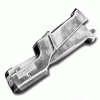This is another one of my favorites:
http://www.greenlee.com/archive/MA4774.pdf
Customers always love it when they see you matching a level up to everything!
This one from Greenlee is about $35-40, but worth the cost. It has rare earth magnets on one side so it great for sticking to TV mounts so you can check level hands-free while securing them to the wall. The magnets are also strong enough to pick up screws and nails in drywall so it can be used as a low tech stud finder!
http://www.greenlee.com/archive/MA4774.pdf
Customers always love it when they see you matching a level up to everything!
This one from Greenlee is about $35-40, but worth the cost. It has rare earth magnets on one side so it great for sticking to TV mounts so you can check level hands-free while securing them to the wall. The magnets are also strong enough to pick up screws and nails in drywall so it can be used as a low tech stud finder!










